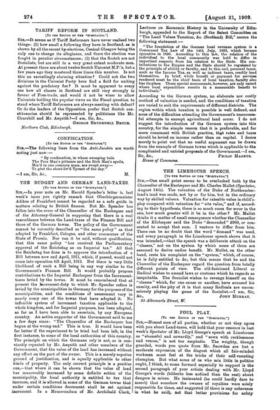THE BUDGET AND GERMAN LAND-TAXES.
[To TIIE EDITOR. Or TIIII SPECTATOR:] SIR,—In your note on Mr. Harold Spender's letter iu last week's issue you rightly remark that Oberbilrgermeister Adikes of Frankfurt cannot be regarded as a safe guide in matters relating to British finance. But Mr. Spender has fallen into the error of the Chancellor of the Exchequer and of the Attorney-General in supposing that there is a real resemblance between the Land-taxes of the Finance Bill and those of the German towns. The policy of the Government cannot be correctly described as "the same policy" as that adopted by Frankfurt, Cologne, and other communes of the State of Prussia. Nor can it be said, without qualification, that this same policy "has received the Parliamentary approval of the Reichstag as an Imperial tax." All that the Reichstag has done is to approve the introduction of a Bill between now and April, 1911, which, if passed, would not come into operation till April, 1912. But there is very little likelihood of such a Bill being in any way similar to the Government's Finance Bill. It would probably propose contributions to the Imperial Exchequer from the Increment- taxes levied by the towns. It must be remembered that at present the Increment-duty to which Mr. Spender refers is levied by the municipalities in Germany for the purposes of the municipalities, and the conditions of assessment vary in nearly every one of the towns that have adopted it. No inflexible system of increment taxation applicable to the whole kingdom, and for Imperial purposes, has been adopted, so far as I have been able to ascertain, by any European country. An active supporter of the Government said to me a few days since : "The Chancellor of the Exchequer has begun at the wrong end." This is true. It would have been far better if the experiment to be tried had been left, in the first instance, to some of the local authorities of this country. The principle on which the Germans rely is not, as is con- stantly repeated by Mr. Asquith and other members of the Government, that the value of the laud has increased without any effort on the part of the owner. This is a merely negative ground of justification, and is equally applicable to other kinds of property. The only correct principle is a positive one,— that where it can be shown that the value Of land has measurably increased by some definite action of the municipality, the local authority is entitled to tax that increase, and it is allowed in some of the German towns that under certain conditions decrement shall be set against increment. In a Memorandum of Mr. Archibald Clark,
Lecturer on Economic History in the University of Edin- burgh, appended to the Report of the Select Committee on "The Land Values Taxation, &c. (Scotland) occurs the following statement :—
"The foundation of the German local revenue system is a Communal Tax Law of the 14th July, 1893, which became operative in 1895. According to this law, the relation of the individual to the local community was held to differ in important respects from his relation to the State. His con- tributions to the Empire and the State should be regulated by the principle of ability or faculty, and to this end, personal taxes, such as the Income Tax, as well as indirect taxes, readily lend themselves. In brief, while benefit or payment for services rendered must be the chief basis of local taxation, faculty also has its place. These special assessments, however, are only raised where local expenditure results in a measurable benefit to individuals."
According to the German system, no elaborate nor costly method of valuation is needed, and the conditions of taxation are varied to suit the requirements of different districts. The region within which taxation is possible is well defined, and
none of the difficulties attending the Government's unsuccess- ful attempts to exempt agricultural land occur. I do not suggest the introduction of the German system into this country, for the simple reason that it is preferable, and far more consonant with British practice, thet rates and taxes should be levied on income rather than on capital. I desire merely to point out that no useful argument can be drawn from the example of German towns which is applicable to the complicated and untried proposals of the Government.—I am,






































 Previous page
Previous page